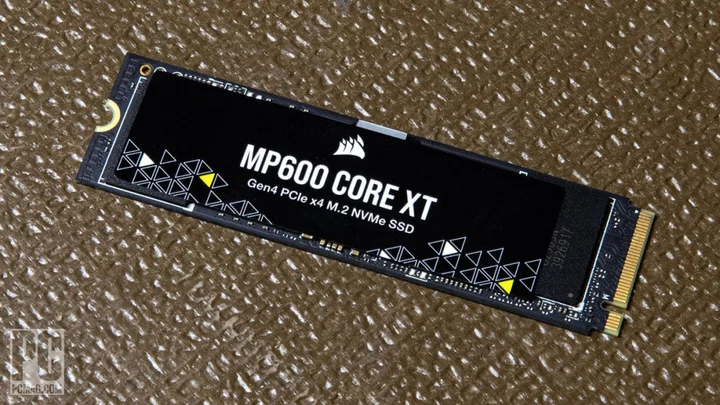Corsair's MP600 Core XT ($114.99 for 2TB as tested) is an internal SSD with midrange speed for a PCI Express 4.0 drive. The Core XT's use of quad-level cell (QLC) flash memory keeps the drive's cost down (it's $59.99 for 1TB, or $284.99 for 4TB) and allows relatively high capacity for a budget solid-state drive. But the use of QLC also limits its durability long-term for heavy writes. The Core XT met its rated sequential read and write speeds in our tests and was even the fastest in our comparison group at writing small (4K-block-size) files. But its PCMark 10 scores—which rate an SSD's speed for everyday storage tasks—were on the low side of average, and its 3DMark Storage gaming score was at the bottom of the list. Just know that you're trading off write endurance to gain low-cost capacity, in the event you'll put this drive to heavy write duty.
Low Price, High Capacity, Reduced Durability
The MP600 Core XT is built on an M.2 Type-2280 (80mm long) "gumstick" printed circuit board and uses the NVMe 1.4 protocol over the PCIe 4.0 bus. It combines Micron's 176-layer QLC 3D NAND flash memory with a Phison PS5021-E21T controller. (Unfamiliar with M.2 and PCIe jargon? Check out our guide to SSD terminology.)
One way this Corsair SSD keeps costs down is omitting a dynamic random-access memory (DRAM) cache, instead enlisting your PC's main memory as a host memory buffer (HMB). This can cause a hit in performance.
QLC memory is another cost saver. QLC technology stacks four bits per NAND flash-memory cell. The design facilitates the creation of higher-capacity M.2 drives (hence the availability of a 4TB version) and is also relatively cost-effective. Based on Corsair's list prices, in fact, the MP600 Core XT has one of the lowest costs per gigabyte of any M.2 SSD we've reviewed. In addition, while 4TB and 8GB drives generally charge a substantial premium per gigabyte over 1TB and 2TB models, that's not the case with the MP600 Core XT: Its 4TB stick costs just a bit more per gig than the lower capacities, with a list price below many 2TB SSDs. (That said, retail SSD prices are often considerably lower than list prices, but neither Corsair nor retailers like Newegg and Walmart are discounting the MP600 Core XT, at least yet.)
As we mentioned, solid-state drives based on QLC NAND flash memory tend to be less durable for heavy write activity than TLC or MLC drives, as indicated by lower terabytes written (TBW) ratings. TBW refers to how much data can be written to a drive before its individual cells begin to fail. That doesn't mean the entire drive will stop functioning, but that cells will be taken out of service, making less storage available as time goes on.
The MP600 Core XT's durability ratings are in line with or a bit better than other QLC-based SSDs we've seen. For example, the Sabrent Rocket Q4 is rated at 200TBW for its 1TB model, 400TBW for 2TB, and 800TBW for 4TB. Again, durability ratings for TLC drives are much higher; the ADATA Legend 850, for instance, is rated at 1,000TBW (1TB) and 2,000TBW (2TB).
The drive works with Corsair's SSD Toolbox, a downloadable app that displays drive and S.M.A.R.T. information and allows for overprovisioning, secure erase, cloning, and TRIM optimization. The MP600 Core XT also supports AES 256-bit hardware-based encryption, the gold standard for consumer-level drive encryption.
Corsair warranties the drive for five years as long as you don't exceed its TBW rating in that time. In reality, unless you regularly write and overwrite large amounts of data (more than typical for consumer PC use), you're unlikely to exceed even a QLC drive's TBW maximum before the warranty runs out.
Testing the MP600 Core XT: Spot-On Sequential Speed Scores, Fast 4K Writes
We test PCI Express 4.0 internal SSDs using a desktop testbed with an MSI X570 motherboard and AMD Ryzen CPU, 16GB of Corsair Dominator DDR4 memory clocked to 3,600MHz, and a discrete graphics card.
We put the MP600 Core XT through our usual internal SSD benchmarks, comprising Crystal DiskMark 6.0, PCMark 10 Storage, and a relatively new test, UL's 3DMark Storage benchmark. The 3DMark test measures a drive's performance in a number of gaming-related tasks and gives a single aggregate score. Crystal DiskMark's sequential speed tests provide a traditional measure of drive throughput, simulating best-case, straight-line transfers of large files.
Corsair's rated sequential read and write speeds for the MP600 Core XT proved spot-on, with the drive matching them almost exactly in our Crystal DiskMark testing. While its 4K (small-block-size) read speed was average among the PCI Express 4.0 drives in our comparison group, its 4K write speed was the highest. That measurement is particularly important when the SSD is used as a boot (operating system) drive, though we tested the MP600 Core XT as a secondary drive as we always do.
As for PCMark 10, its overall storage test measures a drive's speed in performing a variety of everyday tasks. The PCMark 10 trace results measure its mettle for specific tasks such as booting the OS, loading creative programs and games, and copying both small and large files.
The MP600 Core XT was a bit below middling in PCMark 10's Overall Storage Test and in most of the trace scores. Its best performance came in ISO (large file) copying, where it joined a subgroup near the top of the pack.
As for 3DMark Storage, that benchmark measures times for installing, loading, playing while recording a gameplay video, saving, and/or copying a Steam folder of various AAA titles. The MP600 Core XT's gaming score was narrowly the lowest in our test group.
Verdict: 4TB at a Bargain Price
The MP600 Core XT's use of QLC NAND flash memory, combined with its lack of a DRAM cache, help to give this SSD one of the lowest list prices we've seen at the 4TB capacity, and the 2TB we tested is competitively low with other QLC solutions. Its durability rating, however, is low too, and although it did fairly well in a few benchmarks, its PCMark 10 and 3DMark gaming scores were mostly undistinguished.
If a low price for max capacity is your top concern in a PCI Express 4.0 SSD, the Corsair MP600 Core XT is well worth consideration. Its performance won't knock your socks off—look to the Editors' Choice award-winning ADATA XPG Atom 50 for a budget drive with some peak gaming chops—but it should be fine for tasks other than maximum-throughput, intense gaming, video editing, or other content-creation tasks that demand peak sustained read and write speeds with large files. The rarity of a bargain SSD available with 4TB capacity adds to its appeal.









